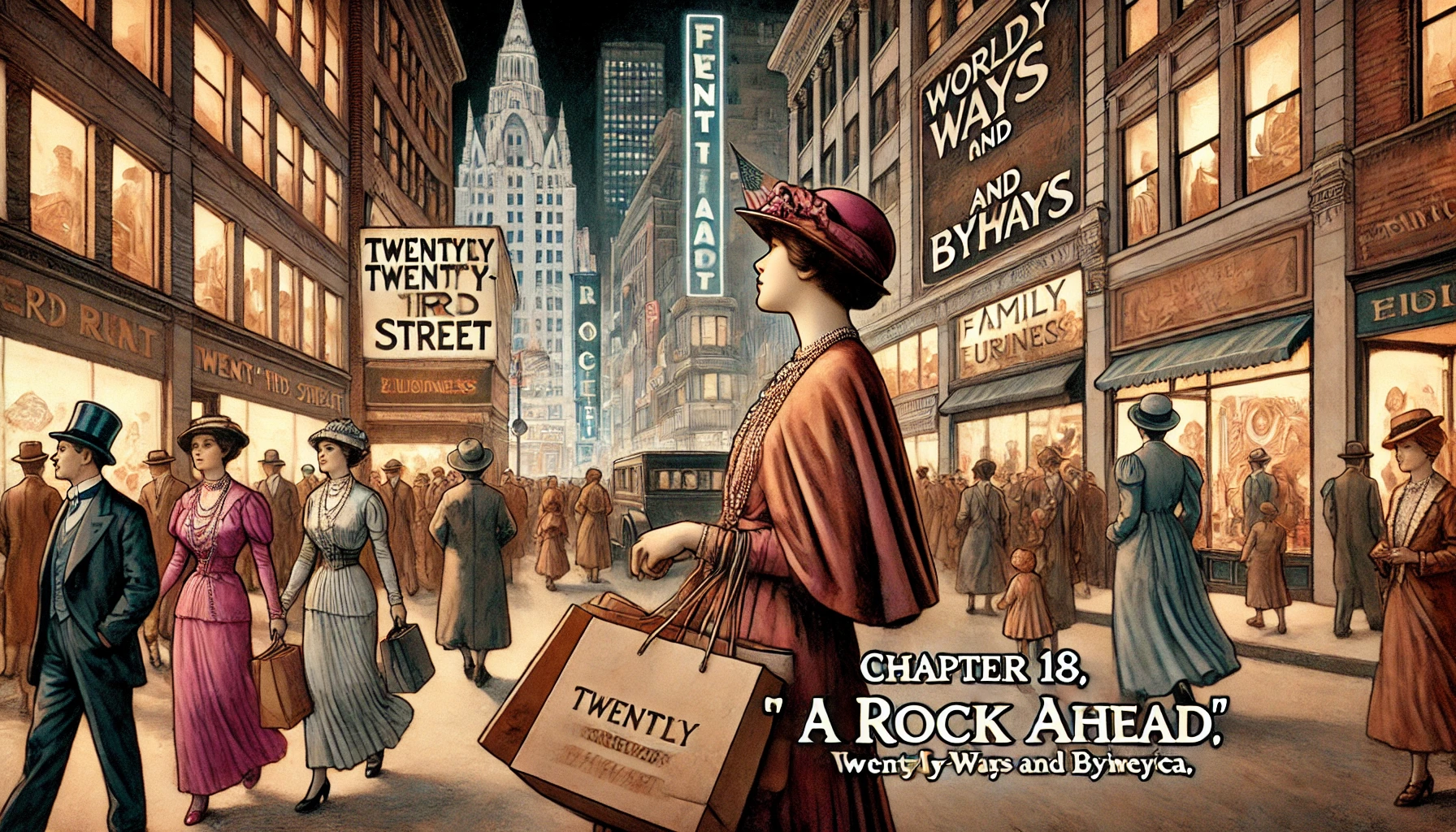Chapter 18 — A Rock Ahead
byChapter 18 – A Rock Ahead focuses on the growing social gap between American husbands and their wives, particularly in how responsibility and daily concerns are divided. The narrator, while strolling near Twenty-third Street, sees a constant flow of women indulging in shopping, absorbed by displays and bargains. This pattern, he argues, illustrates a troubling disconnect—many women appear unaware of their household’s financial reality, treating shopping not as necessity but as recreation. Rather than being active contributors or partners in family decisions, these women are framed as ornamental figures, distanced from the pressure and problem-solving faced by their husbands. Their detachment is not out of malice, but from being conditioned to believe their role lies only in maintaining appearances and social graces. Over time, this results in a widening emotional and practical gulf, weakening what should be a shared life.
The narrator contrasts this with European households, where wives are often seen working beside their husbands, even if the work is modest or behind the scenes. In such partnerships, there’s an unspoken understanding between spouses—they know each other’s struggles, business concerns, and ambitions. When the wife understands the cost of every sale or the consequence of a late invoice, her role becomes more than symbolic; it becomes integral. He observes that women in such environments not only manage domestic affairs but often contribute financially or advise strategically, providing valuable insight. This model, he argues, produces stronger families and healthier marriages, as shared responsibilities lead to deeper bonds and mutual respect. It is not about reducing femininity but about elevating the role of women beyond decoration or dependence.
Chapter 18 – A Rock Ahead explores how the American ideal of placing women on a pedestal has, paradoxically, limited their influence and usefulness within marriage. When wives are removed from decision-making and treated solely as recipients of comfort and luxury, they are denied the dignity of participation. Many women, raised in this mold, learn to equate worth with how much they are given, not with what they contribute. The result is a cycle of dependence and disillusionment—men grow weary under the financial and emotional weight, while women, unknowingly complicit, continue to demand without understanding the cost. This isn’t a critique of women’s desires but a commentary on how societal norms can lead to imbalance and dissatisfaction. The pedestal, though meant to honor, isolates them instead.
The narrator also touches on the resentment that can quietly build when expectations go unmet. Men, expected to provide without limits and remain emotionally available, find themselves trapped in dual roles—provider and entertainer. Wives, meanwhile, feel unfulfilled despite being given material comforts, because their emotional and intellectual needs remain neglected. Without shared purpose or understanding, both partners become strangers in the same home. The American system, he suggests, promotes comfort at the cost of connection. In contrast, the European model values participation over pampering, encouraging spouses to walk side by side rather than along separate paths. This difference, though subtle, changes everything in a marriage—responsibility becomes mutual, and satisfaction comes not only from receiving but from contributing.
Chapter 18 – A Rock Ahead concludes with a call for realism and partnership in modern relationships. Instead of idolizing women to the point of exclusion, it argues for re-integrating them into the daily realities of life, both in business and home affairs. The author believes women are capable of more than society permits and that their potential is stifled when they are kept away from the pulse of family survival. As educational opportunities grow, and as more women enter the workforce, this change may occur naturally. However, the shift will require men and women alike to redefine what partnership means. It’s not a matter of assigning blame, but of encouraging awareness. A marriage where both individuals understand and engage in the trials of life offers more stability than one based solely on chivalry or tradition.
Today, as dual-income households have become more common, this insight from the 19th century feels surprisingly modern. Studies have shown that couples who share financial decision-making and household responsibilities report higher relationship satisfaction. According to a Pew Research Center report, shared duties are ranked among the top factors for a successful marriage. Chapter 18’s message—though wrapped in period-specific language—remains relevant: balance in a relationship comes from shared load, not separation of roles. When both partners step off the pedestal and walk together on solid ground, the relationship becomes resilient, grounded, and truly collaborative.


